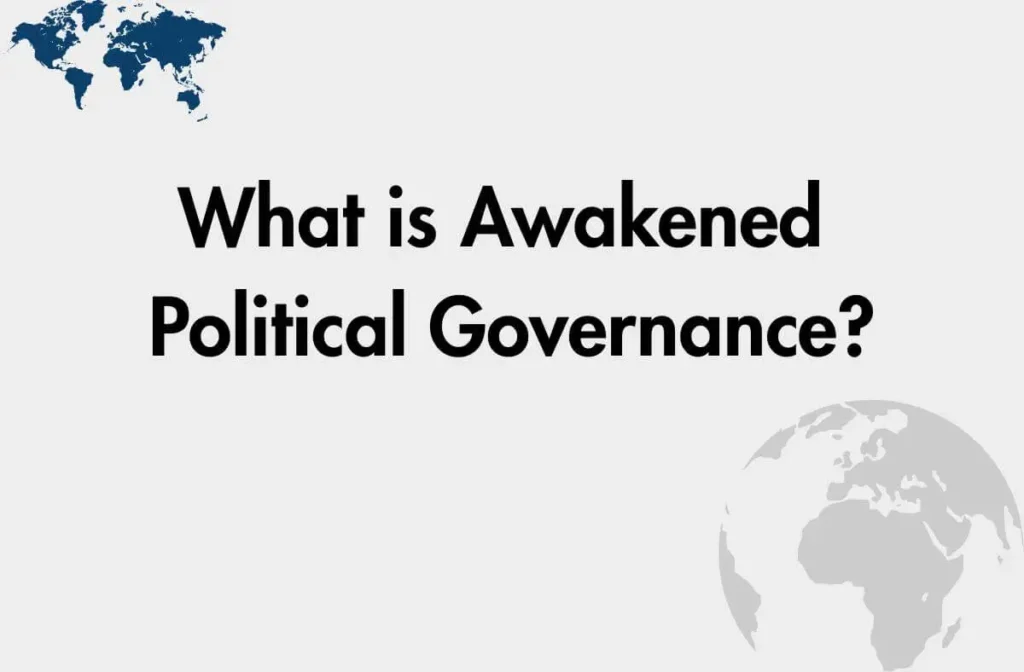
Introduction – The Need for Awakened Political Governance
Awakened Political Governance is the living system through which societies organize authority, institutions, and decision-making. Unlike global governance, which manages collective challenges across borders, political governance begins within nations, shaping how laws are made, how institutions function, and how citizens experience justice and rights. Yet its influence extends far beyond national borders. The way states govern internally directly impacts diplomacy, trade, security, and cooperation, making political governance one of the driving forces that sustains and strengthens the global order.
For decades, conventional approaches have reduced political governance to control, partisanship, and the pursuit of authority. Systems designed to serve citizens too often collapse into rivalry, leaving societies polarized and institutions vulnerable. When this fragmentation occurs, the cracks spread outward, weakening not only domestic systems but also the very structures of global governance that rely on national stability and accountability.
Here, Awakened Political Governance enters as a transformative presence. It links leadership character to institutional conduct, turning governance & leadership into one field rather than parallel tracks. Rooted in the depth of Awakened Governance and the philosophy and frameworks of Awakened Leadership, it realigns politics with ethics, responsibility, and systemic clarity. It shows that leadership in politics is not measured by electoral victories or partisan gains, but by the courage to guide societies with truth, integrity, and foresight, rooted in love, compassion, and human values, not only rights.
In this redefinition, politics becomes the meeting point of governance & leadership. When governance structures are awakened, they embody responsibility instead of rivalry, awakened conscience instead of manipulation. This fusion makes politics both an inner compass for nations and a stabilizing force for the wider global system.
While many models have called for reform, from attempts at conscious governance that promote awareness to frameworks of transformational governance seeking change at scale, these efforts often remain partial. Awakened Political Governance goes further: it does not stop at awareness or reform but carries a living ethic of presence and remembrance that connects institutions, states, and citizens into one coherent rhythm of accountability and vision. This fusion is how domestic political culture strengthens global governance: coherent nations negotiate, implement, and cooperate with integrity.
Defining Awakened Political Governance – Beyond Power and Partisanship
Political governance has traditionally been understood as the practice of organizing authority through parties, parliaments, and government institutions. It directs how policies are drafted, how resources are allocated, and how nations are steered through cycles of leadership. In its conventional form, this governance often mirrors the contest for power, where partisanship and short-term calculations dominate the long-term well-being of citizens.
Awakened Political Governance redefines this landscape. It does not treat politics as a battleground of ideologies but as a system of stewardship anchored in clarity, purpose, and responsibility. Here, governance is measured not by party dominance or electoral numbers but by the capacity to protect values, rights, uphold justice, and serve the collective good of society with compassion, courage, truth, and authenticity. It becomes a political ethic where integrity shapes lawmaking, accountability strengthens institutions, and foresight safeguards the nation’s future. This approach extends beyond conventional good-governance benchmarks by rooting accountability and transparency in a lived ethic of presence and conscience, then carrying them into design through the anchors and the five-step rhythm.
This awakening transforms political governance into a discipline of service — one that links authority with vision, and leadership with awakened conscience. It goes beyond any good governance leadership, where power is exercised transparently, laws are enforced with fairness, and institutions remain resilient under pressure. In this awakened political governance model, politics no longer operates as a self-contained struggle for survival or misuse of power, but as a channel of public trust that sustains both national stability and the credibility of global cooperation.
By holding itself accountable to truth and responsibility, Awakened Political Governance creates conditions where citizens experience the full depth of leadership in good governance. Its processes no longer revolve around symbolic victories or formalities but around the transformation of public life into a space of fairness, dignity, and shared progress. Where transformative governance literature calls for structural change, Awakened Political Governance names a practiced cadence for it: Accept, See, Unite, Shift, Improvise, so institutions can change and stay coherent in motion. It is also where public policy leadership finds its highest calling, not in managing policies for convenience but in shaping awakened frameworks that serve life at scale, ensuring political systems evolve as guardians of their people’s well-being and humanity’s long-term future.
The Core Anchors of Awakened Political Governance
Awakened Political Governance draws its foundation from the same four anchors that guide all awakened systems. These are not abstract concepts or distant ideals but applied principles that carry presence, responsibility, and service into political life. They ensure that political systems act not as machines of control but as living frameworks where leadership, law, and conscience move together in coherence. Though their center is national, their effects ripple outward, reinforcing trust and cooperation at the global level.
Inner Vision: Foresight in Representation
In politics, Inner Vision becomes the compass that directs nations beyond immediate cycles of elections and partisanship. It calls for legislative clarity, constitutional foresight, and policies that protect not only the present but the generations yet to come.
- When political leaders embody this anchor, they resist short-term populism and guide societies with continuity of vision.
- Integrity in representation emerges as the expression of Inner Vision, ensuring that elected authority becomes an instrument of wisdom and not merely of numbers.
This anchor grounds politics in an awakened systemic leadership approach, where national choices create stability at home and reliability in the wider world.
Heart-Centered Alignment: Trust as the Political Ethic
Political systems collapse when trust dissolves between citizens and their leaders. Heart-Centered Alignment restores this trust by ensuring that laws, decisions, and institutional actions remain anchored in fairness and dignity.
- It requires parties and parliaments to act from awakened conscience rather than manipulation, turning negotiation into service of the people’s mandate.
- This alignment makes governance leadership authentic, citizens see their rights upheld and their voices valued.
When political governance carries this anchor, it becomes not only resilient at the national level but also a reliable partner in the global community.
Life’s Essence: Adaptive Politics with Principle
Every nation faces turbulence, economic downturns, social unrest, pandemics, security shocks. Life’s Essence equips political governance with the resilience to adapt without betraying principle.
- It ensures that constitutions remain flexible where needed but never lose their ethical spine.
- It allows public systems to adjust to changing realities while holding true to the protection of justice, equity, and responsibility.
Here, leadership at the system level is tested most directly: the ability to improvise responsibly, to reform wisely, and to sustain coherence in the face of disruption.
Materiality: From Promises to Lived Realities
The true credibility of political governance lies in whether commitments reach the people. Materiality grounds intentions into visible outcomes, justice served in courts, welfare reaching communities, and budgets translating into services that uplift lives.
- It ensures that political promises do not remain rhetoric but become realities that citizens can trust.
- It translates governance from speech into systemic impact, making democracy and accountability tangible in daily life.
Through Materiality, Awakened Political Governance transforms politics into an ethic of delivery, where national trust strengthens global confidence in a state’s integrity.
Anchors as a Living Field
Together, these four anchors create a living field where politics and leadership move as one. They show that Awakened Political Governance is not merely about laws or structures but about embedding vision, trust, resilience, and delivery into the very heart of public life. National in application yet global in consequence, these anchors establish a rhythm where citizens are protected, systems remain coherent, and the wider world benefits from nations governed with awakened clarity.
The Living Rhythm of Awakened Political Governance
If the anchors provide foundation, rhythm ensures continuity. Awakened Political Governance moves through the same five living steps, a spiral of action that keeps political systems both coherent and adaptive. This rhythm allows nations to reform themselves from within, while also strengthening their reliability in the wider global order.
Accept: Facing Political Realities
Political leadership begins by accepting systemic realities such as corruption, inequality, voter mistrust, and institutional bias. By confronting these conditions openly, political governance clears denial and builds the ground for reform. This step is the start of awakened governance transformation, acknowledging that problems left unnamed cannot be solved.
See: Sharpening Political Perception
To govern responsibly, leaders must see clearly the difference between policies that serve people and those that exploit them. This sharpened perception equips political governance to distinguish genuine reform from performative politics. When leaders embody this clarity, they engage in awakened leadership and systems thinking, ensuring that decisions are rooted in coherence rather than short-term appearances.
Unite: Building Coherence in Politics
No political system can thrive when divided into endless factions. Unite calls for forging coherence across parties, parliaments, and institutions. It shifts politics from rivalry into collective service, ensuring that governance reflects the shared good of the nation. This coherence builds national resilience and also strengthens global credibility, as divided states weaken both themselves and the systems of cooperation they participate in.
Shift: Embedding Structural Transformation
The real measure of political governance is whether reforms reshape systems. Shift means carrying transformation into the structures themselves: campaign finance reform, judicial independence, transparent administration, accountable parliaments. These systemic changes mark the threshold where awakened transformational governance moves from theory into practice. Political governance evolves not only to manage crises but to build frameworks of fairness that endure across generations.
Improvise: Resilience in Motion
Politics is a field of constant change. Improvise ensures governance adapts to demographic shifts, social unrest, technological disruption, and crises without betraying its core principles. It balances responsiveness with integrity, ensuring political systems remain alive to the needs of their people. By improvising with an awakened conscience, states show that adaptability is not weakness but strength, allowing both domestic institutions and global partners to trust their steadiness, setting new standards of good governance every time.
Rhythm as Political Life
Together, these five steps create the living rhythm of Awakened Political Governance. They turn political life into a process of acceptance, perception, coherence, structural reform, and resilience. National in focus yet global in effect, this rhythm ensures that politics becomes a field of accountability and service, shaping systems that protect societies at home and reinforce cooperation abroad.
Watch Explainer:
The Dimensions of Awakened Political Governance
Awakened Political Governance takes shape through the institutions and practices that define national life. These dimensions show how politics, aligned with awakened conscience and responsibility, shifts from power maintenance to service and protection of truth. Each dimension is national in operation yet, when carried with integrity, builds trust in the global order.
Parliamentary Systems: Clarity in Lawmaking
Parliaments translate collective will into legislation. In awakened practice, they embody clarity, courage, and compassion: laws are drafted with precision, debated with honesty, and enacted with foresight. They move beyond gridlock and rivalry and become centers of coherence where the nation’s long-term direction is articulated. Here, governance & leadership meet, ensuring lawmaking reflects the moral compass of society rather than factional interest.
Political Parties: Service Beyond Power Struggles
Parties should channel ideas, not only pursue dominance. Awakened Political Governance recasts them as vehicles of public service, designing programs that uplift citizens and strengthen unity. The measure is not slogans but a proven capacity to serve with integrity. Parties aligned with this ethic model of responsibility in governance and resilience in cooperation, setting new standards of good governance nationally and in global dialogues.
Public Administration: Integrity in Execution
Public administration is where governance touches daily life. Rooted in awakened principles, administrative systems embody fairness, transparency, and accountability. Budgets reach communities, policies are implemented without bias, and institutions act as instruments of justice and care. This dimension anchors leadership in good governance, showing that the machinery of the state can function with honesty and clarity.
Policy and Legislation: Embedding Conscience in Law
Policies and laws shape how societies evolve. In awakened governance, they protect dignity, equity, and the environment. Public policy leadership peaks here: leaders anticipate technological disruption, climate risk, and demographic shifts, crafting frameworks that secure the future without compromising the present. An awakened conscience becomes law’s hidden spine, ensuring fairness outlives electoral cycles and building public trust and shared participation.
Judiciary and Oversight: Checks Aligned with Truth
Courts and oversight bodies safeguard justice by holding leaders to account. In awakened governance, these institutions embody truth rather than politics. Judicial independence, transparent oversight, and fair enforcement sustain citizens’ trust and keep authority accountable. This protects the soul of governance; authority without accountability cannot endure.
Media and Public Discourse: Truth in Communication
Modern politics lives in communication. Awakened Political Governance affirms that free, responsible media are guardians of accountability. Public discourse grounded in truth enables meaningful participation in democracy or any other style of governance. This keeps governance leadership transparent and helps citizens distinguish clarity from manipulation. The media remain unbiased, questioning power fearlessly and standing in truth regardless of who controls the system.
Citizens: The Living Base of Governance
No political system exists without its people. Awakened governance regards citizens as participants in the nation’s conscience, not passive voters. Civic education, participatory platforms, and open dialogue make governance a shared responsibility. When citizens embody awakened values, institutions gain legitimacy and resilience.
Local-National Coherence: Federal and Municipal Alignment
Where power is shared across tiers, awakened governance ensures clarity of roles, fiscal transparency, and citizen-centric delivery from municipalities to the center. This coherence prevents duplication, closes service gaps, and turns devolution into a force for accountability.
A Coherent Political Field
Together, these dimensions make Awakened Political Governance more than an arrangement of institutions. They form a coherent field where authority, law, justice, and service move in balance. National in scope yet global in effect, they create nations that are trustworthy partners abroad and guardians of their people’s dignity at home.
The Role of Institutions, Governments, and Political Actors
Awakened Political Governance rests not on single actors but on their collective alignment. Governments, parliaments, parties, civil services, and citizens each hold distinct responsibilities, yet their meaning emerges only when carried together in coherence. In this alignment, governance leadership ceases to be fragmented authority and becomes a systemic ethic of service.
Governments act as stewards of collective responsibility, setting direction with foresight. Parliaments safeguard fairness in policymaking. Parties channel the diversity of public will, civil services ensure continuity and execution, and citizens alongside civil society remain the living base of legitimacy. Their individual roles are not new, what is new is the awakened field they create when each acts from awakened conscience and responsibility rather than rivalry or misalignment.
This awakened interplay brings good governance leadership into lived practice. Authority is exercised transparently, institutions act with fairness, and citizens see themselves not as passive recipients but as participants in the system’s conscience. In such a rhythm, political governance becomes systemic leadership in motion, national in its operation yet strengthening trust in the global arena.
Awakened Political Governance in Relation to Other Forms
Awakened Political Governance does not exist in isolation. It is part of a larger field of awakened systems, each carrying its own scope while reinforcing the others. Clarifying these boundaries ensures that the political dimension contributes to, rather than overlaps with, the wider architecture of awakened governance.
Awakened Global Governance serves as the umbrella for challenges that no nation can resolve alone, climate change, migration, pandemics, international trade, security. Awakened Political Governance strengthens this order by ensuring that nations negotiate and implement global commitments from positions of integrity and stability.
Awakened Governance is the broader philosophy applied to all systems, from organizations and businesses to nations and international institutions. Awakened Political Governance is its application to the political sphere, where the stakes involve the balance of power, law, and citizen trust.
Awakened Diplomacy acts as the living connector. Where politics shapes national priorities and global governance manages shared challenges, diplomacy carries the thread between them. Awakened Political Governance sustains diplomacy by grounding it in credibility: states that govern with awakened conscience become partners that can be trusted on the global stage.
Awakened AI Governance intersects when politics sets the rules for how technology evolves. Decisions around digital rights, data protection, and artificial intelligence require political leadership that is awakened, capable of regulating technology with foresight and ethics. Political governance here becomes the safeguard ensuring that innovation serves life rather than undermines it.
Seen together, these forms reveal how political governance stands as a bridge: rooted in the national domain, yet decisive in shaping the credibility and coherence of the global order.
The Awakened Leadership Compass as a Guide for Political Systems
Awakened Political Governance requires instruments that help leaders navigate complexity with clarity and conscience. The Awakened Leadership Compass is one such embodiment of the awakened leadership flow, a living GPT tool designed for research, analysis, and decision-making aligned with truth, responsibility, and long-term vision. It is not a substitute for political systems, but a rare guide that brings purpose to power and clarity to leadership.
The Compass enables parliaments, governments, and institutions to test policies and reforms against awakened criteria: do they serve equity, protect dignity, and sustain coherence beyond short-term advantage? By carrying presence into analysis and foresight into decision-making, the Compass strengthens the ability of political systems to remain resilient, ethical, and trustworthy.
As one of many expressions of awakened leadership, the Compass demonstrates how philosophy can manifest into practice. It helps leaders, organizations, and institutions anchor their choices in awakened conscience while shaping systems that endure. It stands as a gift to humanity and a reminder that political governance, when guided by awakened tools, evolves as service to citizens and as a contribution to the coherence of the wider world.
Conclusion: The Movement of Awakened Political Governance
Awakened Political Governance marks a profound shift from politics as control to politics as stewardship. It integrates conscience into authority, responsibility into institutions, and awakened systemic leadership into the very heart and soul of national life. By embedding clarity, fairness, and foresight, it transforms politics from rivalry into coherence and from short-term gains into lasting trust.
Pioneered by SunDeep Mehra, Global Pioneer of Awakened Leadership and founder of the Awakened Leadership Movement, Model, and Awakened Governance, this vision is not theory but an invitation. Nations, governments, parliaments, and political parties are called to embody this awakening, to let politics become a field of service where integrity guides lawmaking, resilience sustains institutions, and citizens see themselves reflected in governance that protects their dignity. Political leaders are invited to adopt Awakened Political Governance as a living practice, shaping systems that are accountable at home and trustworthy across the world.
Rooted in the global Awakened Leadership Movement, this shift extends beyond reform into a living movement of awakened conscience. It is part of a larger leadership awakening where visionary leadership, systemic clarity, and awakened transformational governance are no longer aspirations but practices carried into public life, bringing soul to the system.
The movement now asks for participation. Let governments, parties, and leaders embrace Awakened Political Governance as their compass, and let citizens hold them to this awakened standard. To follow the unfolding of this pioneering work, stay connected with SunDeep Mehra and the Awakened Leadership Movement, a living channel for clarity in politics, systems, and leadership.
Connect on X and LinkedIn to walk with this awakening and be part of the rhythm shaping political governance for the future nations and humanity as a whole.
















